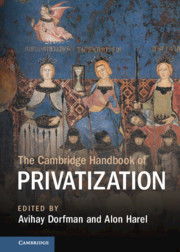Book contents
- The Cambridge Handbook of Privatization
- The Cambridge Handbook of Privatization
- Copyright page
- Contents
- Figures
- Tables
- Contributors
- Acknowledgments
- Introduction
- Part I On the Virtues of Public Provision (Agency-Based Approaches)
- Part II On the Virtues of Publicness as a Means to the Realization of Procedural Values (Process-Based Theories)
- Part III Outcome-Based Theories: On the Virtues and Vices of Public Provision as a Means to Promote Efficiency and Justice
- 11 Privatization of Legal Institutions
- 12 On Privatizing Police, with Examples from Japan
- 13 Privatization of the Police
- 14 Privatizing Private Data
- 15 Political Connections, Corruption, and Privatization
- 16 Privatization of Regulation: Promises and Pitfalls
- 17 Privatization of Accounting Standard-Setting
- Index
15 - Political Connections, Corruption, and Privatization
from Part III - Outcome-Based Theories: On the Virtues and Vices of Public Provision as a Means to Promote Efficiency and Justice
Published online by Cambridge University Press: 27 August 2021
- The Cambridge Handbook of Privatization
- The Cambridge Handbook of Privatization
- Copyright page
- Contents
- Figures
- Tables
- Contributors
- Acknowledgments
- Introduction
- Part I On the Virtues of Public Provision (Agency-Based Approaches)
- Part II On the Virtues of Publicness as a Means to the Realization of Procedural Values (Process-Based Theories)
- Part III Outcome-Based Theories: On the Virtues and Vices of Public Provision as a Means to Promote Efficiency and Justice
- 11 Privatization of Legal Institutions
- 12 On Privatizing Police, with Examples from Japan
- 13 Privatization of the Police
- 14 Privatizing Private Data
- 15 Political Connections, Corruption, and Privatization
- 16 Privatization of Regulation: Promises and Pitfalls
- 17 Privatization of Accounting Standard-Setting
- Index
Summary
The relationship between corruption and privatization is a complex one. In some cases, they are conceived as polar opposites, with privatization touted as a strategy to combat corruption. In others, they are synonyms: privatization is perceived as a product of or a mechanism to enable corruption. In this chapter, I argue that there are particular circumstances in which each of these hypotheses may prevail, suggesting that the answer to the question “who gains from privatization?” is largely dependent on context. An accurate picture needs to consider the multiple phases of the privatization process, the unique institutional framework in which decisions are made, and the particularities of the sector(s) involved. To develop this argument, I organize the vast literature on the political economy of privatization according to three key moments: the decision to privatize (before privatization), the privatization process (during privatization), and the dynamics governing the privatized structures (after privatization).
Keywords
- Type
- Chapter
- Information
- The Cambridge Handbook of Privatization , pp. 245 - 262Publisher: Cambridge University PressPrint publication year: 2021
- 1
- Cited by

